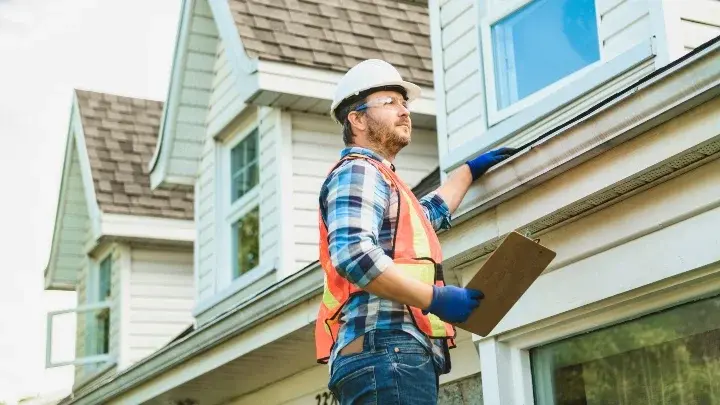Whether you are purchasing a new home, preparing to sell, or maintaining an existing property, a thorough home inspection is essential for identifying potential problems before they turn into costly repairs. In this article, we’ll explore what a home inspection entails, why it’s so important, and how to choose a qualified professional to conduct the inspection.
What Is a Home Inspection?

Inspection is a comprehensive examination of a property condition, typically conduct by a licensed and experienced professional. During the dingdongtogel inspection, the inspector will assess the home’s various components and systems, from the foundation to the roof, to identify any existing or potential issues that could affect the home’s safety, value, and longevity.
A typical home inspection involves checking the following areas:
-
Structural components: The foundation, walls, and framing of the home to ensure there are no signs of cracks, instability, or damage.
-
Roofing: An inspection of the roof to assess its condition, age, and any potential issues like leaks or missing shingles.
-
Plumbing: The water supply system, drains, and pipes to check for leaks, water pressure issues, or other plumbing problems.
-
Electrical systems: The wiring, outlets, circuit breakers, and electrical panels to ensure they are safe and functioning properly.
-
HVAC (Heating, Ventilation, and Air Conditioning): An inspection of the furnace, air conditioning unit, ducts, and vents to confirm they are in good working order.
-
Appliances: If included in the sale, appliances like the dishwasher, oven, and refrigerator will be tested for proper operation.
-
Exterior: The exterior of the home, including siding, windows, doors, and landscaping, to identify any potential damage, water issues, or pest problems.
-
Interior systems: The condition of flooring, walls, ceilings, and windows inside the home, as well as any signs of mold, moisture, or pests.
The inspector will compile a detailed report of their findings, highlighting any problems or areas in need of attention. This report can serve as a valuable tool for negotiating repairs, adjusting the sale price, or planning future maintenance.
Why Is a Home Inspection Important?
A home inspection plays a critical role in ensuring that your property is safe, secure, and in good condition. Here are several reasons why getting a professional home inspection is so important:
1. Uncover Hidden Problems
Homes may look perfect on the surface, but there could be hidden issues lurking that aren’t immediately visible. Structural issues, plumbing leaks, electrical malfunctions, or roof damage might not be apparent without a thorough inspection. A professional inspector has the experience and tools to detect these issues early on, helping you avoid surprise repairs down the road.
For example, mold can often go unnoticed in areas like the attic or crawl space. If left untreated, mold can cause significant damage to the property and pose serious health risks. An inspector will check for signs of mold and recommend treatments if needed.
2. Ensure Safety and Security
A major part of a home inspection is evaluating the safety of the property. Faulty wiring, gas leaks, or issues with the HVAC system can be hazardous, especially if they go undetected. A home inspection can identify potential safety risks that may not be obvious to the untrained eye, allowing you to address them before they become a threat to your family’s well-being.
3. Prevent Expensive Future Repairs
Home inspections can save you money in the long run. By identifying small issues before they escalate, a home inspection can help you avoid costly repairs or replacements. For instance, if the inspector identifies a roof leak that could worsen over time, you’ll have the opportunity to fix it before it leads to more extensive water damage.
If you’re purchasing a home, a pre-purchase inspection can reveal problems that may affect the property’s value or require expensive repairs. Knowing the condition of the home allows you to make an informed decision about whether it’s worth the investment, and it could help you negotiate a better price.
4. Provide Peace of Mind
For both buyers and homeowners, a home inspection provides valuable peace of mind. For homebuyers, it ensures that they aren’t inheriting costly problems or safety risks. For homeowners, regular inspections can help them stay ahead of maintenance issues, providing reassurance that their property is in good condition.
5. A Valuable Tool for Negotiation
For buyers, a home inspection can be a key tool during the negotiation process. If the inspection uncovers significant issues, such as faulty plumbing or a failing roof, buyers can use the inspector’s report to request repairs or a reduction in the price. Sellers can also use a home inspection report to proactively fix issues before listing the property, making it more appealing to buyers.
For sellers, an inspection report can demonstrate transparency and help build trust with potential buyers. If problems are identified early, sellers can address them before the home goes on the market, improving the home’s overall value and marketability.
How to Choose a Professional Home Inspector
Choosing a qualified home inspector is one of the most important steps in ensuring you get an accurate and thorough assessment of the property. Here are some tips for selecting the right professional:
1. Look for Credentials and Experience
A reputable home inspector should be licensed, certified, and have experience in the field. In the U.S., for example, home inspectors may be certified by organizations such as the American Society of Home Inspectors (ASHI) or the National Association of Home Inspectors (NAHI). These certifications ensure that the inspector has met specific education and experience requirements and adheres to industry standards.
2. Check Reviews and References
Before hiring a home inspector, it’s a good idea to check reviews online or ask for references from previous clients. A reliable inspector will have a track record of delivering detailed, accurate reports and offering excellent customer service. Don’t hesitate to ask about their experience with inspecting homes similar to yours.
3. Ask About the Inspection Process
Make sure you understand what the inspection includes and how long it will take. A thorough inspection typically takes a few hours, depending on the size of the property. A qualified inspector will explain their process, what they’ll be looking for, and how they will communicate their findings to you.
4. Get a Sample Report
Ask for a sample inspection report to get an idea of how detailed and comprehensive the inspection will be. A good report should include clear explanations, photos of issues, and recommendations for repairs or further evaluation. The report should be easy to understand, even for those with no technical knowledge.
5. Consider the Cost
While you shouldn’t choose an inspector solely based on price, it’s important to get quotes from a few different professionals. Prices can vary depending on location, property size, and the scope of the inspection, but the cost should reflect the inspector’s qualifications and experience.
Conclusion: The Value of a Home Inspection
A home inspection is an essential step in ensuring your property is safe, secure, and well-maintained. Whether you’re buying a new home, maintaining an existing property, or selling, a professional inspection provides valuable insights that can save you time, money, and stress in the long run. By identifying potential problems early on and addressing them proactively, you can maintain the value and integrity of your home.
Whether you’re a homeowner, Residence buyer, or Residence seller, working with a qualified and experienced home inspector is crucial. With their help, you can be confident that your property is in good condition and ready for whatever comes next. Don’t underestimate the value of a thorough inspection—after all, when it comes to your home, there’s no such thing as being too cautious.




